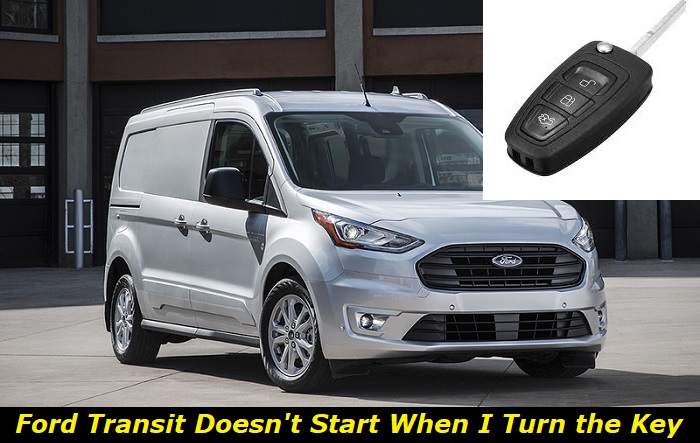Imagine this, you get into your Ford Transit and put the key into the ignition. You turn the key and wait for the engine to roar to life. But, nothing happens! Why does this happen, and what should you do next? Don't sweat it, CARARAC is here for the rescue!
No-crank-no-start problem highlights
- Level of urgency:High
- Can you drive?Obviously, no
- DIY inspection:Possible
- DIY repair:Possible but complicated
- Price for repair:$150 - $500
- Common Reasons:Power, starter, wiring, ignition cylinder
- Ways to fix:Check the battery, jump the starter, check wiring and connections

Symptoms of Ford Transit Not Starting
Millions of people across the globe rely on Ford Transits for transportation and work. So, it can be frustrating when these workhorses refuse to start up.
Apart from the engine not starting up, here are some other symptoms of the issue we are going to discuss in this article.
- The engine doesn't turn over when cranking
- Warning lights on the dashboard
- Dim or flickering lights
- Slow cranking
- No fuel pump noise
- Burning smell from the alternator
If you are experiencing one or more of these issues with your Ford Transit, you have come to the right place. Each of these symptoms can help you pinpoint the source of the startup problem, and we'll tell you everything you need to know to do just that.
Main Causes of Ford Transit Not Starting When You Turn The Key
As I mentioned earlier, an array of different problems can result in your Ford Transit refusing to start when the key is turned in the ignition. Here are the ones that Ford Transit owners complain the most about.
1) Dead Battery
Does your Transit crank really slow when you turn the key? Or does it refuse to crank at all? Both these symptoms are indications of a dead battery. As you might already know, the electricity from the battery is essential for a vehicle to start. With a dead battery, your Transit won't start no matter how hard you try.
You can confirm that a dead battery is the culprit behind the startup issues by performing a voltage test using a multimeter. Ideally, the voltage should be 12.6 volts or above when the engine is off.
However, if the battery keeps dying regularly, there might be some other underlying issues with the electrical system of your Transit. If this is the case, don't hesitate to take your van to the nearest mechanic and have them take a look at it.
2) Corroded Battery Terminals
If the battery in your Transit is more than a few years old, battery corrosion might be the cause behind your troubles. A car battery contains a mixture of water and sulfuric acid, which can emit corrosive gases as it ages. Corrosion occurs when these gases contact the metal on the battery's exterior.
The corrosion blocks the flow of electricity between the battery and other components which prevents the engine from starting. If you spot blue, green, or white buildup on the battery terminals, this has already happened. Give the terminals a proper cleaning, and you are off to the races.
3) Bad Starter Motor
As the name suggests, the starter motor is responsible for cranking the engine over when you turn the key inside the ignition. Unfortunately, starter motors tend to go bad after about 100,000 miles, presenting Transit drivers with engine startup issues. Clicking sounds coming from the engine when you turn the key is a tell-tale sign of a faculty starter motor.
4) Faulty Alternator
So, you replaced the battery but your Transit still won't start? In that case, you might want to take a look at the alternator. The alternator distributes electrical power throughout the vehicle, while also keeping the battery charged. When this part goes bad, constant battery drains are unavoidable.
Although alternators on modern cars can last between 200,000 - 300,000 miles, they can fail prematurely depending on how you use your vehicle. And with the Ford Transit being a commercial vehicle, we won't rule out failures due to heavy-duty use!
5) Issues With The Immobilizer
The immobilizer is a device created with good intentions. It is supposed to prevent your vehicle from car thieves. But, sometimes the immobilizer can malfunction, giving vehicle owners some serious headaches. Just ask Jeremy Clarkson about his old Ford GT!
If your Transit has an immobilizer, the engine won't run unless it gets a special code from the key. However, if this device malfunctions, the van won't start even though you have the correct key. If this happens to you, the only way to get your Transit back up and running is by bypassing its immobilizer.
First, try to do this by reprogramming the immobilizer. If that fails, we recommend seeking the help of a professional. On the other hand, you might be tempted to rip out the immobilizer from the engine and keep driving. We advise you to refrain from doing this, as removing the immobilizer makes your Transit vulnerable to theft.
6) Fuel Pump Failure
Just like any other vehicle, the Ford Transit requires a constant fuel flow to keep the engine running. Delivering fuel from the gas tank to the engine is the fuel pump's responsibility. If the fuel pump fails, this fuel flow will be cut off, and the engine will seize to start.
Fuel pumps can fail either due to contamination or natural wear. If you have been encountering engine issues prior to the startup problems, it might be time for you to get the fuel pump replaced.
7) Blown Fuses
Modern vehicles come with dozens of fuses that protect electrical systems and wiring. Sometimes, a blown fuse might be the reason behind your Transit van not starting after turning the key.
When talking about fuses, we can't ignore the Transit's starter relay. This tiny component also resides inside the fuse box and is responsible for directing electricity from the battery toward the starter motor. Once there, the starter motor uses this power to turn over and start the engine.
Similar to the battery terminals, the starter relay is also vulnerable to corrosion. Heat, age, and dirt buildup are some other factors that shorten the lifespan of this relay.
Nonetheless, if you aren't much experienced with vehicle repairs, it's better not to tamper with the fuse box. Instead, leave this work to the professionals.
8) Clogged Fuel Filter
Ford recommends Transit owners change the fuel filter every 5 years or 50,000 miles. Although this filter does not wear out like the other components of your vehicle, it will get clogged with dirt and debris present in the fuel.
Over time, the fuel filter will get dirty to the point where the engine loses performance. On some occasions, it won't start at all. Replacing the fuel filter at the recommended intervals is the best way of preventing this.
In addition to the issues mentioned above, loose spark plugs, fueling issues, torn timing belts, engine overheating, and insufficient lubrication have also been linked with Ford Transit startup issues.
Are There Any Quick Fixes?
If your Ford Transit won't start, here are some quick fixes you can try.
- Jumpstart the engine-If a dead battery is the reason why your Transit won't start, jump-starting is the quickest way to get back out on the road. All you need are some jumper cables and another vehicle. Or, you can try using a battery booster as well.
- Clean the battery terminals- Cleaning the battery terminals with a stiff brush and a cleaning solution will remove any buildup, and reestablish the electricity flow. However, make sure to turn the ignition off and detach the battery cables before proceeding.
- Hitting the starter with a hard object -Although this might seem like the caveman way of fixing things at first glance, hitting the starter motor with something hard will help start your Transit if the gears inside have gone out of alignment.
- Run an OBD2 scan -If all else fails, you can run an On-Board Diagnostics (OBD) scan to identify the faulty component that's keeping your engine from starting. Simply run the scan, and check for the resulting error codes online. This will point you toward the parts that need replacement.
Final Thoughts
It can be frustrating when your beloved Ford Transit refuses to start when you turn the key. On most occasions, these startup issues are caused by electrical gremlins with the vehicle. However, as we discussed here today, there are some other mechanical issues that prevent engines from starting as well.
So, the next time your Transit starts acting up, make sure to use what you learned here today to get back on the road as quickly as possible.
About the authors
The CarAraC research team is composed of seasoned auto mechanics and automotive industry professionals, including individuals with advanced degrees and certifications in their field. Our team members boast prestigious credentials, reflecting their extensive knowledge and skills. These qualifications include: IMI: Institute of the Motor Industry, ASE-Certified Master Automobile Technicians; Coventry University, Graduate of MA in Automotive Journalism; Politecnico di Torino, Italy, MS Automotive Engineering; Ss. Cyril and Methodius University in Skopje, Mechanical University in Skopje; TOC Automotive College; DHA Suffa University, Department of Mechanical Engineering






Add comment